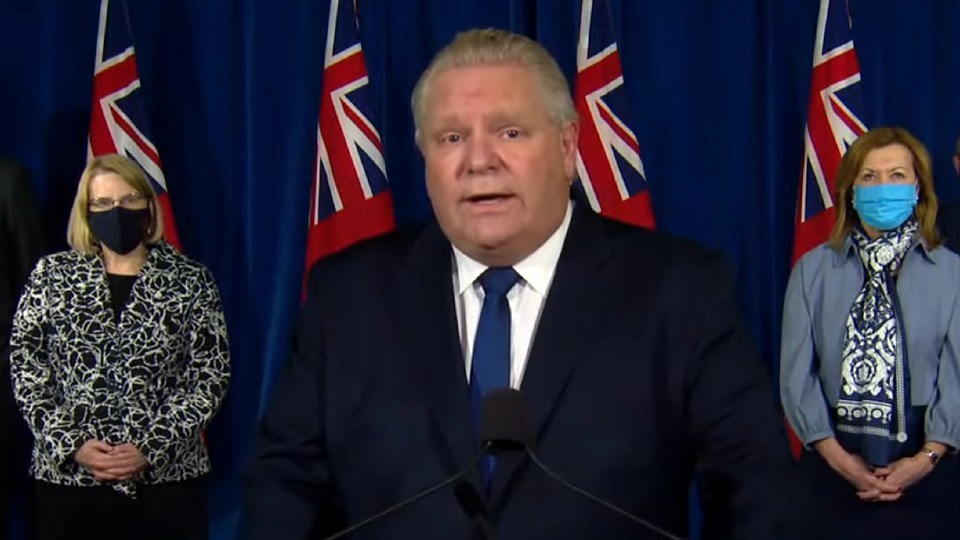With one-third of Ontario's population ignoring normal COVID-19 pandemic precautions and with more people getting sick and dying, Ontario Premier Doug Ford has issued a stay-at-home order in the hopes that the "bad actors" out there will heed the advice.
This means the province has declared a second provincial emergency as defined in the Emergency Management and Civil Protection Act (EMPCA).
The premier said the stay-at-home order, which is part of the emergency declaration, takes place this Thursday January 14 at 12:01 a.m. It will be in place for 28 days until Thursday February 11, 2021.
"Under this order, everyone must stay home and only go out for essential trips to pick up groceries or go to medical appointments," said Ford.
The premier added that Ontario's health care system is on the brink of collapse with COVID-19 cases and deaths at the highest levels ever in Ontario.
"New reports and data show that one-third of Ontarians are not following public health guidelines. Many are travelling and gathering," said Ford.
He said he wasn't blaming anyone, except the virus itself. He said anyone letting their guard down is putting family members and friends at risk.
Ford said the stay-at-home order was indeed a drastic measure that wasn't being taken lightly.
"Everyone must stay home to save lives. It couldn't be any clearer."
A news release from the premier's office stated "the government is issuing a stay-at-home order requiring everyone to remain at home with exceptions for essential purposes, such as going to the grocery store or pharmacy, accessing health care services, for exercise or for essential work.
"This order and other new and existing public health restrictions are aimed at limiting people's mobility and reducing the number of daily contacts with those outside an immediate household. In addition to limiting outings to essential trips, all businesses must ensure that any employee who can work from home, does work from home," said the news release.
The premier commented that walking the dog or going out to stretch your legs in the evening was not against the order.
Under the new rules, non-essential retail stores, including hardware stores, alcohol retailers, and those offering curbside pickup or delivery are allowed to open no earlier than 7 a.m. and be closed no later than 8 p.m. These restricted hours of operation do not apply to stores that primarily sell groceries and foodstuffs, pharmacies, gas stations, convenience stores, and restaurants for takeout or delivery, said the news release.
The premier said the province intends to take action against those who do not comply.
"Enforcement and inspections will increase. Provincial and local police, bylaw officers, workplace inspectors will enforce these new measures.
"Under the declaration they will have powers to disperse people and to issue tickets to bad actors — bad actors who are caught — they will get fined," said Ford.
He added that the Ministry of Labour has 450 workplace inspectors who will also be enforcing the emergency order.
Ford added that although the emergency is a hard pill to swallow for Ontario citizens, it is absolutely necessary for Ontario to beat the pandemic. Ford said the province and the federal government are working together with such things as helping by providing a $200 per child daycare subsidy, a discounted electricity billing rate, a wage subsidy and a rent-relief program.
The premier pleaded with the public to hang in for another 28 days saying that with the vaccine program being rolled out, "there is hope on the horizon." He reminded the audience about Dr. Adelsteinn Brown's projections for a "worst-case scenario" if Ontario residents do not follow the precautions. He was referring to the briefing Brown provided at Queen's Park on Tuesday morning.
"If we don't, we are going to see the numbers we saw in the modelling that Dr. Brown showed us and if that isn't scary enough, I don't know what is. We are seeing potentially cases going up to 15,000 (per day)," said Ford.
"Folks, please. Twenty-eight days. We've come so far together. We need to stick together," said Ford.
The premier added that the province is not imposing a curfew, unlike what has happened in Quebec. He said a curfew would be too much like a police state. He said he didn't want to think of the idea of police waiting at the end of your driveway at 8 p.m. to make sure you stayed in the house.
Also commenting at the Tuesday event was Ontario Solicitor General Sylvia Jones who said the idea of the emergency declaration is to have people live by the restrictions of no more than five persons (beyond your family) at any gathering and to avoid any non-essential travel.
